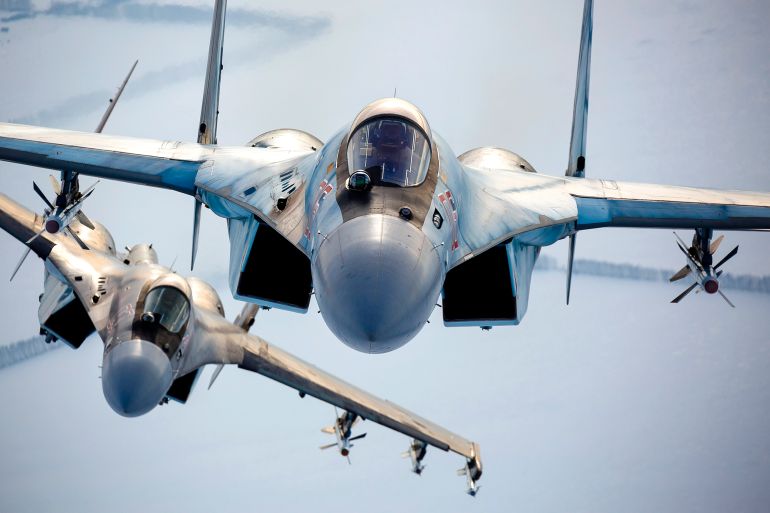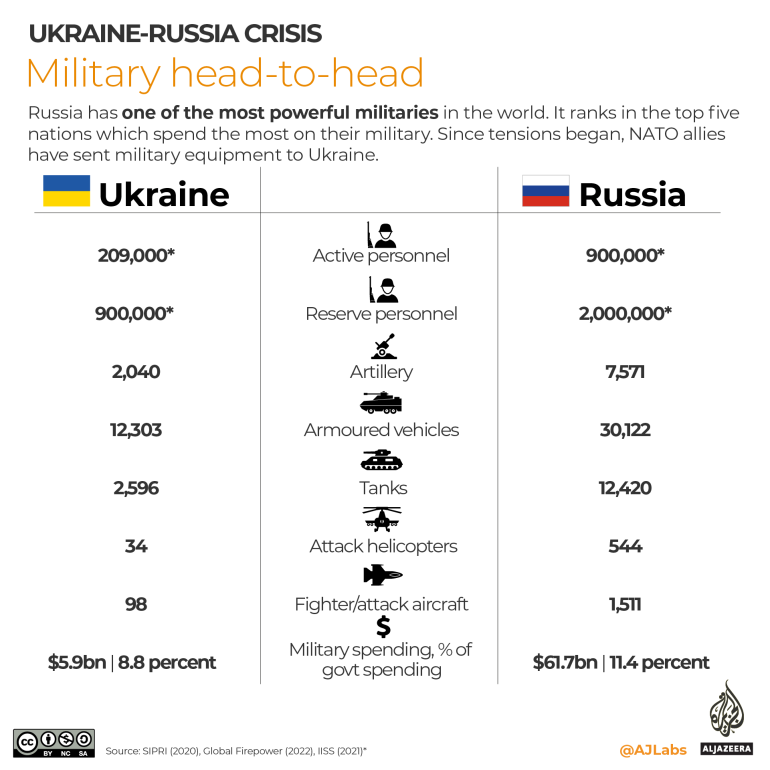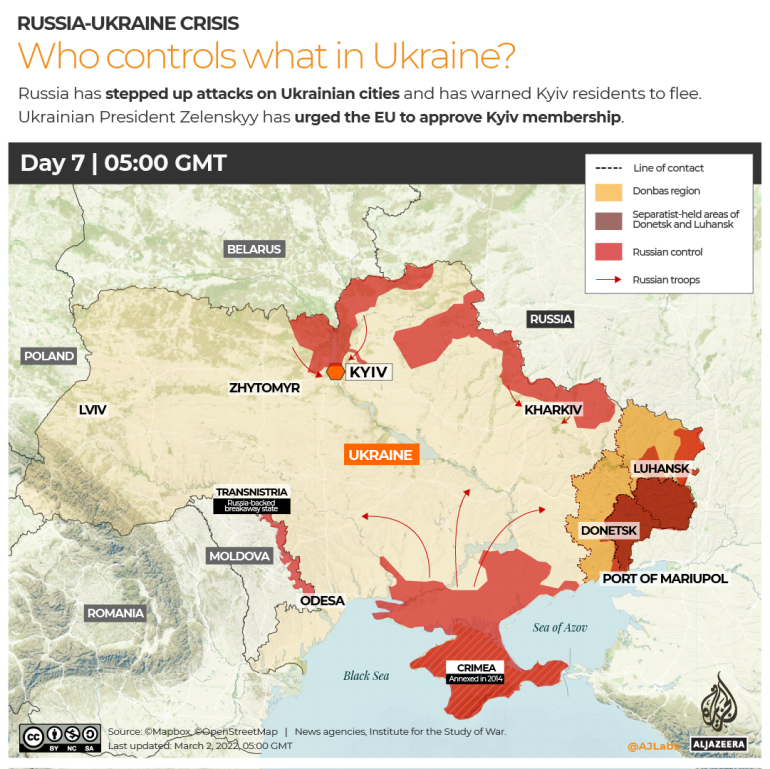Why hasn’t Russia mobilised its vast air power against Ukraine?
The first six days of invasion have confounded expectations that Russia would try to immediately destroy Ukraine’s air force.

Before Russia’s invasion of Ukraine, United States intelligence had predicted a blistering assault by Moscow that would quickly mobilise the vast Russian air power that its military assembled in order to dominate Ukraine’s skies.
But the first six days have confounded those expectations and instead seen Moscow act far more delicately with its air power, so much so that US officials cannot exactly explain what is driving Russia’s apparent risk-averse behaviour.
Keep reading
list of 4 itemsPolish farmers suspend blockade of Ukraine border
Ukraine’s Zelenskyy and NATO chief Stoltenberg urge faster arms supplies
Russell Bentley: Pro-Russia fighter from US dies after Donetsk ‘abduction’
“They’re not necessarily willing to take high risks with their own aircraft and their own pilots,” a senior US defence official told Reuters news agency, speaking on condition of anonymity.
Vastly outmatched by Russia’s military, in terms of raw numbers and firepower, Ukraine’s own air force is still flying and its air defences are still deemed to be viable – a fact that is baffling military experts.
After the opening salvos of the war on February 24, analysts expected the Russian military to try to immediately destroy Ukraine’s air force and air defences.
That would have been “the logical and widely anticipated next step, as seen in almost every military conflict since 1938,” wrote the Royal United Services Institute (RUSI) think-tank in London, in an article called The Mysterious Case of the Missing Russian Air Force.
Instead, Ukrainian air force fighter jets are still carrying out low-level, defensive counter-air and ground-attack sorties. Russia is still flying through contested airspace.

Ukrainian troops with surface-to-air rockets are able to threaten Russian aircraft and create risks for Russian pilots trying to support ground forces.
“There’s a lot of stuff they’re doing that’s perplexing,” said Rob Lee, a Russian military specialist at the Foreign Policy Research Institute.
He thought the beginning of the war would be “maximum use of force”.
“Because every day it goes on, there’s a cost and the risk goes up. And they’re not doing that and it just is really hard to explain for any realistic reason.”
The confusion over how Russia has used its air force comes as US President Joe Biden’s administration rejected calls by Kyiv for a no-fly zone that could draw the US directly into a conflict with Russia, whose plans for its air force are unclear.
Military experts have seen evidence of a lack of Russian air force coordination with ground troop formations, with multiple Russian columns of troops sent forward beyond the reach of their own air defence cover.
That leaves Russian soldiers vulnerable to attack from Ukrainian forces, including those newly equipped with Turkish drones and US and British anti-tank missiles.
David Deptula, a retired US Air Force three-star general who once commanded the no-fly zone over northern Iraq, said he was surprised that Russia did not work harder to establish air dominance from the start.
“The Russians are discovering that coordinating multi-domain operations is not easy,” Deptula told Reuters. “And that they are not as good as they presumed they were.”
While the Russians have been underperforming, Ukraine’s military has been exceeding expectations so far.
Ukraine’s experience from the last eight years of fighting with Russian-backed separatist forces in the east was dominated by static World War I-style trench warfare.
By contrast, Russia’s forces received combat experience in Syria, where they intervened on the side of President Bashar al-Assad, and demonstrated some ability to synchronise ground manoeuvres with air and drone attacks.
Ukraine’s ability to keep flying air force jets is a visible demonstration of the country’s resilience in the face of attack and has been a morale booster, both to its own military and Ukraine’s people, experts say.
It has also led to mythologising of the Ukrainian air force, including a tale about a Ukrainian jet fighter that purportedly single-handedly downed six Russian aircraft, dubbed online “The Ghost of Kyiv”.
A Reuters Fact Check showed how a clip from the videogame Digital Combat Simulator was miscaptioned online to claim it was an actual Ukrainian fighter jet shooting down a Russian plane.

Biden led a standing ovation in support of Ukrainians in his State of the Union speech on Tuesday, praising their determination and mocking Putin for thinking he could just “roll into Ukraine” unopposed.
“Instead he met a wall of strength he never imagined. He met the Ukrainian people,” Biden said.
The US estimates that Russia is using just over 75 aircraft in its Ukraine invasion, the senior US official said.
Ahead of the invasion, officials had estimated that Russia had potentially readied hundreds of the thousands of aircraft in its air force for a Ukraine mission. However, the senior US official on Tuesday declined to estimate how many Russian combat aircraft, including attack helicopters, might still be available and outside Ukraine.
Both sides are taking losses.
“We do have indications that they’ve lost some (aircraft), but so have the Ukrainians,” the official said. “The airspace is actively contested every day.”